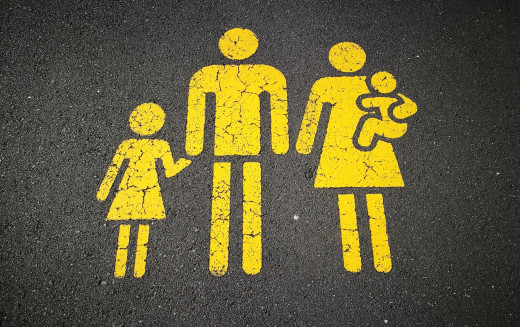Why Blurring Gender Roles Could Be a Cause for Marriage Break
Traditionally, the family was built on foundations that clearly defined gender roles for men and women. However, this has changed over time, thanks to the feminist movement.
In this article, we examine gender roles and why blurring them could be a serious cause of marriage breaks and rising divorce rates.
A study by the University of Maryland in the USA shows a sharp increase in divorce rates between the years 1960 and 1980. By 1980, about 23 divorces were recorded for every 1000 married women. Although there was a steady decline in divorce rates after 1980, recent data suggests that out of all formally recorded marriages more and more are ending in divorce or separation.
For example, figures from the Office of the National Statistics (ONS) show an increase in divorce rates between 2010 and 2012 in England and Wales. There were a total of 118,140 divorces in 2012 compared to 117,558 in 2011. About half of these were said to have occurred in the first 10 years of marriage.
Most of these were first marriages and divorce occurred between the fourth and 8th anniversary. Various factors are cited for divorce such as infidelity.

Increasing fights over unclear responsibilities in the home
Throughout the nineteenth and part of the twentieth century, Men and women had specific roles in society that were thought to be unique to their respective genders. Besides the obvious responsibility of passing their genes to the next generation, men had to be the heads of the home, the breadwinners and sole providers.
They were responsible for securing the home as well as playing judge and disciplinarian. Women on the other hand were responsible for tidying and making the home as homely as possible, grooming the children and comforting men after a hard day’s work.
Everyone's responsibilities in the home were clear. Boys and girls were trained by elders to grow into these responsibilities. The majority of the children learned well and often adapted to these responsibilities satisfactorily. Those who failed were often ridiculed by their peers.
Generally, marriages and families were stronger because the partners were bound together not just by Love, but also by the sense of responsibility for one’s duties in the home. Men took on their duties with a sense of pride, while women played their roles wholeheartedly. Nobody complained and marriages thrived for several decades. The vow of “till death do us part” was upheld in its real sense.
Towards the end of the twentieth century, however, feminist ideologies started to spring up. As industrialization and modernization took precedence, there was agitation for equal opportunity for both men and women.
Feminists felt confining women to the home was unfair treatment since they had equal potential as men to influence world development. The idea was that bread-winning, homemaking and child parenting should be divided equally between husband and wife, to enable the woman time away from home duties.
The style of teaching and training both at home and in schools gradually changed from gender-based to equal opportunity and exposure. Boys were taught to be more involved in house chores, while girls were introduced to the environment away from home. The fundamental principles upon which homes had been thriving were slowly but surely being forgotten.
Life today has continued to evolve along the same path. More women are seen in positions of influence away from home, while men are more required to participate in daily house chores.
This reduction in clarity over responsibilities in the home has led to increasing fights in homes. Women resent their husbands if they can't help with chores, while men demand their wives to contribute to the bills.

Is marriage still relevant today?
Blurred gender roles affect gender rolemodelling for children
Although gender equality is widely embraced, it could be the silent monster eating modern-day marriages because it blurs gender roles. There is a real possibility that it is a significant factor in the increasing number of marriage breaks seen today.
For the record am not against equal rights and opportunity, and neither do I consider women inferior to men. My point is that mixing gender roles in the family can be detrimental. Therefore as one looks out for signs of a successful marriage, the concept of gender roles shouldn’t be ignored.
The idea of men being more involved at home is not necessarily a bad thing because it allows them more time with their children thus actively participating in parenting. The problem is that women and men were created in a way that each is to perform unique roles that complement each other, to build a strong union.
For example, a man cannot be a mother; neither can a woman be a father. Compromising this distinction in roles will deprive the home of the benefits of diverse role models. Men are naturally more adventurous and better risk-takers compared to women who are more cautious and protective.
As children grow, they need to learn and thereafter balance each of these traits to thrive in the cunning world. Eliminating role distinction will deny children the opportunity to actively learn and develop into gender roles and yet those roles are vital for societal morals and cohesion.
I know a couple that separated after 4 years of marriage because the husband was always too tired from work to help his wife in the kitchen. They both had day jobs, but the wife always got home a little earlier. From her point of view, the husband was selfish and inconsiderate for always retiring to the TV, while she toiled with all the chores.
The feminist theory depicts women as victims of male dominance. But it has subconsciously led to more conflicts in homes than ever before. As a result, modern women have forgotten their natural responsibility of homemaking and feel it should be evenly shared with their spouses.
On the other hand, some men have deliberately abandoned their responsibilities of being breadwinners and providers of the family, simply because their women are earning (sometimes better than them). They expect the woman to contribute to paying the bills and school dues. In my opinion, this can strain the marriage.
In some situations, the wife is in a superior position of power in social circles. In such homes, the man is required to attend to the details of home management such as the children’s laundry, feeding and so forth because the wife is too busy with her demanding job and is always too tired for such small things. This kind of home is a typical example of reversed gender roles and is unlikely to survive for long for two reasons;
- It deprives the Man of his pride and eventually turns him into a grumpy nagging husband. Men are naturally egocentric and were created to lead rather than to be followers.
- Secondly, women were specially created. They are better listeners, are more attached to their children, have a sharper eye for detail and are therefore better at child grooming. These are the qualities required for homemaking and men are unfortunately not gifted in this area. As bad as it sounds, it is a fact of life.
Women are strong, and intelligent and provide healthy competition in a busy working environment. They are not inferior to men and must therefore be treated with equal respect, and access to opportunities.
However, the family is the basic unit of society and must be protected. We must recognise that families thrive on gender roles which should be clearly defined. And, it is neither a coincidence nor a mistake that all societies across the globe regardless of race, consider the man as the head and provider of the home.
Therefore attempting to distort this natural order can potentially harm marriage, family and society in the long run. Marriage can only last if both partners understand and accept their roles and responsibilities in the Union.
This content reflects the personal opinions of the author. It is accurate and true to the best of the author’s knowledge and should not be substituted for impartial fact or advice in legal, political, or personal matters.
© 2015 Ian Batanda








